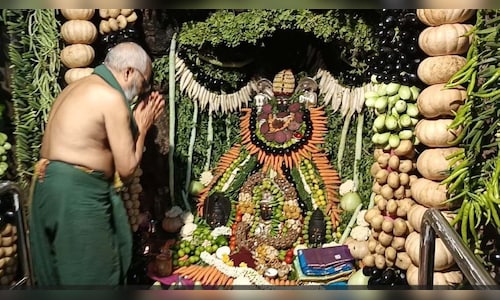Devotees described the sight of the deity, radiant within her decorated cave, as deeply moving. “The hills echoed with chants, and everywhere one looked, nature and faith danced together in harmony,” said a participant told Local18.
Each year during the Ashadha month, this tranquil hill shrine in Kakinada district comes alive with vibrant rituals and spiritual fervour. According to local legend, the goddess referred to as Talampulamma Ammavaru — emerged as a stone idol during the intense penance of sage Agastya, making the site one of immense spiritual energy. She is often called a “thinking goddess” — one who listens and responds to heartfelt prayers, fulfilling the wishes of her devotees.

Also read | Amarnath Yatra: Kashmir CM projects 3.5 lakh pilgrims to visit Holy Shrine by August 9
The 6,000-kilogram offering of vegetables to Goddess Thalupulamma Ammavaru became the spiritual highlight of this year’s Ashadha mahotsavams, drawing thousands of devotees to the sacred hill shrine nestled in the Eastern Ghats of Kakinada district. The grand offering, organised by devotees from Amalapuram, was arranged in the sanctum of the ancient cave temple, creating a vibrant and devotional spectacle that symbolised abundance and community faith.
“These celebrations not only deepen our spiritual connection but also bring our communities together,” said temple executive officer Penumatsa Vishwanath Raju, who is overseeing the temple’s transformation, including the construction of a five-storey Rajagopuram and plans to install an escalator to improve accessibility.
Also read | Tamil Nadu to build Asia’s tallest Lord Murugan statue in Erode, minister PK Sekarbabu confirms
Celebrations throughout the Ashadha month have included weekly rituals such as the Bajula Alankarana and the Lakh Tulasi Puja, but the vegetable offering stood out as a symbol of devotion and generosity. Pilgrims made the uphill trek through thick forests to offer naivedyam, receive prasadam, and participate in special pujas, all under the serene canopy of the Eastern Ghats.
(Edited by : Jerome Anthony)






